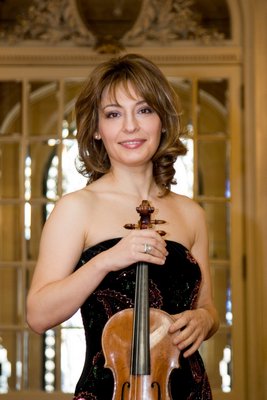
For an hour every Thursday afternoon, Steven Lin would find himself slouched in his chair, arms crossed, staring at the ceiling.
He was 6 years old, sitting next to his mother at the last place he wanted to be in Taiwan: group piano lessons.
At least it was better than the violin, he said.
“I chose piano because I got to sit whenever I practiced, which I remember hating,” Mr. Lin said last week during a telephone interview. “If I was going to do a musical instrument, it’s a lot more comfortable this way. The violin, especially when you’re just starting to learn, the position is very awkward.”
Irina Muresanu knows that better than most. Not only did the Romanian musician pick up a violin for the first time at age 7, she’s also left-handed. It took the young girl four years to warm up to the instrument. But when she finally did, it was in a major way.
“‘Meditation’ by Tchaikovsky. I was in fifth grade. I remember really looking at this piece and feeling like, ‘Well, okay, I have something to say to this,’” Ms. Muresanu said last week during a telephone interview. “That really meant something to me because I was very shy. This helped me get out of my inner self.”
Both prodigious talents will show their musical prowess during the Parrish Art Museum’s inaugural Salon Series, which continues on Friday, October 4, with Mr. Lin playing a piano program and on Friday, October 11, with Ms. Muresanu at the violin.
Making her Hamptons debut at the Salon Series, Ms. Muresanu plans to play an international program by composers from Ireland and South America to China and her native Romania.
“It was, in some ways, the hardest program I have ever done because I had to not only learn how to play in these different styles, but I had to cross a boundary, a territory, a border,” she said. “I had to move myself. In my mind, I had to move myself into a different space.”
For Mr. Lin, that musical realm does not exist in the real world. And it took him 15 years to figure that out—seven of which were spent in the Juilliard Pre-College Division before he graduated into the main school.
“I don’t even think, at that time, I really loved music,” the 24-year-old said. “I loved performing. But I didn’t really fully understand, to be honest. I think I was quite different from other musicians around me.”
Born in America, Mr. Lin moved back to Taiwan when he was 6 months old. He wasn’t forced into learning music—“My mom always did my piano homework for me,” he said, “until she got me a private instructor. Even then, I never practiced every day”—and walked into Juilliard on a lark, not to mention a full scholarship and several competition wins under his young belt.
Mr. Lin was the kid who loved to play sports—basketball especially, he said, which was the worst possible game for his instrumental hands. He was the kid who loved to socialize and explore. And Manhattan was the perfect place to do it.
“I didn’t really practice much, the first two years of college,” he admitted. “It wasn’t until junior year. I was like, ‘Oh no. It’s halfway through college and I haven’t done anything.’ So I started practicing. It wasn’t until senior year in college that I matured. That I understood what music is about.”
Last year, Mr. Lin won the Concert Artists Guild Victor Elmaleh Competition—adding to a growing list of awards—and has played countless venues, including the Sendai International Music competition in Japan.
Except for those who were keenly observant, the pianist didn’t even seem to flinch when a 6.5-magnitude earthquake rocked the country in the middle of his performance. The musician said he missed only a few notes.
“I didn’t know what it was for, maybe, the first 20 seconds,” he said. “So I kept playing and thought to myself, ‘Wait, what’s happening?’ When I realized what was going on, it was already dying down. I held on. I think I was rushing a little bit because, you know, it was an earthquake.”
The shaking snapped Mr. Lin out of his “zone”—a place he escapes to inside his imagination, inside his feelings, inside the composer’s language. It is there he discovered the true meaning of classical music.
“One word I use to describe it is the spirit,” he said. “It’s hard to define music in words. It’s another world. You’re in another world. As a performer, you’re trying to bring the audience to your world and that you can never feel in the real world.”
The Salon Series will continue with pianist Steven Lin on Friday, October 4, and violinist Irina Muresanu on Friday, October 11, at 6 p.m. at the Parrish Art Museum in Water Mill. Performances are approximately one hour, without intermission, followed by artist receptions. Tickets are $20, or $10 for members. For more information and a full schedule, call 283-2118 or visit parrishart.org.